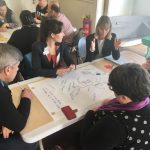




I’ve been thinking… about Hosting Community
Dee Brooks, a community development expert, talks about the Art of Hosting, relationships, connections, engagement and having conversations that matter.
By Dee Brooks – 6th September, 2017
Mike Green and Henry Moore of the ABCD Institute were onto something, years ago, when they coined the phrase “leading by stepping back” as a successful way to work within a community.
Many years ago, when I was frustrated with how ABCD could be applied in transient communities, and even though I could envision how it might look – I couldn’t clearly see my next step, I met Mike. Through frustrated tears (mine), miles of travelling Australia’s east coast and lengthy in-between-workshop discussions, Mike explained to me that leading by stepping back is not leading from an organisational perspective, it’s not pushing community-led work from behind but, it’s still more than ‘walking beside’ community members; it’s a container, it’s a safety net, it’s a dance!
The Art of Hosting is all about principles and practices which; invite a deeper sense of self into the practice of community work, explore participatory leadership, encourage a deeper awareness of individual & collective impact and emphasise the importance of nurturing a community of practice.
Hosting is about relationships, connections, engagement and having conversations that matter. We do this in what is defined as circle and we follow the guidelines of leading circle practice practitioners like Peer Spirit, which are:
Principles
- Rotate leadership
- Take responsibility
- Have a higher purpose that you gather around
Practices
- Speak with intention: Noting what has relevance to the conversation in the moment
- Listen with Attention: Respectful of the learning process of all members of the group
- Tend to the Well-being of the Group: Remaining aware of the impact of our contributions
I remember nervously setting up a room in circle, for a large government department training and watching the surprised faces of the managers and executives as they entered the room.
I overheard one participant say to another, “what airy fairy crap is this?” and I asked them to trust the process and give it a go. I then watched with fascination as they took turns to “check-in” using a talking piece from the middle of the circle and witnessed a deeper level of connection and trust almost instantaneously emerge. Their feedback mirrored what I saw; people felt they got to know each other in a different, and deeper way by giving themselves over to the power of circle and allowing themselves to be hosted.
If we can create a safe and intentional space for people to truly listen and learn from each other, whether at an individual, community or government level, then we will have offered a place where all voices can be heard, where challenges are raised, assumptions surfaced and we open the space for opportunities to emerge.
There are a number of strategies and tools that can improve dialogical participation, like Open Space, 4-Fold Practice and World Café. It’s not always easy but if we start with small steps and practice some “safe to fail” experiments like, moving a board meeting into circle or simply introducing a talking piece to the meeting room table, then we start to disrupt old systems that are no longer serving us. We open the opportunity to be part of a refreshing and new way of working together.
The world is ever changing, we hear about citizen frustration, broken systems and government alienation but I witness so much of the opposite. I see community members offering their gifts, skills and talents in times of crisis or when systems fail them. I hear stories of whole neighbourhoods leading the work with local government to enact local change.
Hosting is not the “new black” of facilitation. It is complimentary and can be applied alongside, depending on the context and degree of engagement. Facilitation is a process of getting from A to B, whereas hosting allows everyone to be heard and offers a space for the unknown to emerge. Reflecting on Mike’s words, facilitation is the container, hosting is the safety net and they dance together, oh so well!
Life’s a dance. Create a circle. Poke the system.
Dee is a member of the Jeder Institute, ABCD (Asset-based Community Development) Institute Faculty Member, ABCD Asia Pacific Network Facilitator, Art of Hosting Steward, Oceania Director International Association of Community Development (IACD).


